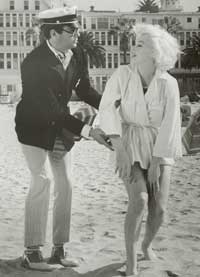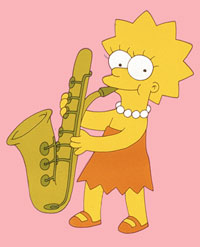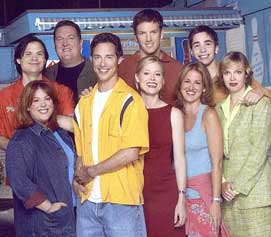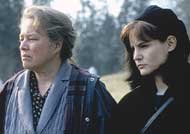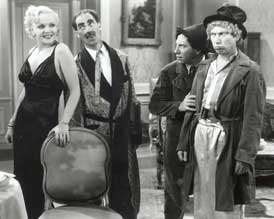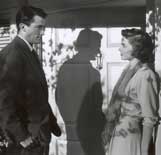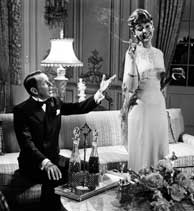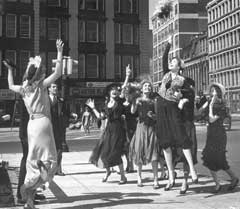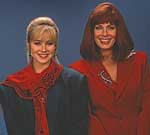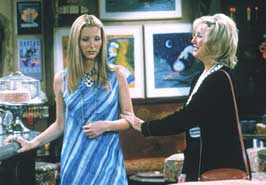Popular Culture: Vassar Steals the Spotlight
By Veronika Ruff '01
Marilyn Monroe and Groucho Marx did it, and so did an animated Lisa Simpson: talked up Vassar on-screen. They’re not alone — film and television mentions of Vassar are, in fact, ubiquitous. And some Vassar alums are keeping track. Class of ’95 grads Sara Bensman and David Ezer became so interested in the plethora of Vassar references that they began compiling a database of sorts. Ezer, a self-described "huge film buff," and Bensman, a former film critic for
The Miscellany News who now works at the Film Society of Lincoln Center, are collecting and studying mentions for an ongoing project.
Though it may be simple for an observer to catch Vassar utterances in the media, how those mentions come to be is a more complex process. Marshall Battani, who taught courses on popular culture at Vassar and is now an assistant professor of sociology at Michigan’s Grand Valley State University, said mentions like school names are often used deliberately to represent what writers or producers believe the name has come to symbolize. Screenwriter Neil Landau (who co-wrote Don’t Tell Mom the Babysitter’s Dead, a movie chock full of Vassar) said that deciding details like a character’s alma mater is not done at random. "Specificity is what gives life to characters," he said — and often what provides humor.
These mentions could also develop simply because an alum is involved in the production: It may be no coincidence that Vassar is mentioned on popular sitcoms in which alumnae/i star. Justin Long ’99, of Ed, said he tries to give Vassar "little shout-outs" whenever possible. "The writers," he added, "give me a surprising amount of ad-libbing freedom." And though Lisa Kudrow ’85, of Friends, said that the writers don’t usually acknowledge items in the show that personally connect to the actors, both Vassar and Poughkeepsie have been mentioned on her NBC fan-favorite.
Regardless of their origin or intent, Vassar mentions are all "an indication of the college’s prestige and ongoing capital," according to Sarah Kozloff, Vassar professor of film. And any mention in popular culture undoubtedly affects Vassar’s reputation. Assistant Director of Admissions Marivel Oropeza ’99 said she often meets prospective students whose initial association with Vassar was through The Simpsons or the Stephen King movie Dolores Claiborne. "A school’s reputation can certainly be affected by media references to it," Battani agreed, "especially if those references are repeated in a variety of media outlets."
But do these references reflect Vassar’s historic image, or do they mold the Vassar of the future? Battani believes they do a little of both. "Media depictions both shape and are shaped by the ‘real’ world," he said. "Think of the relationship between media and the world as a complex feedback loop in which everyday people (audience members) have influence because the producers want to please and entertain them, and producers have power in that they ultimately control what images will be (re)produced. Producers don’t want to seem out of touch, so they try to respond to taken-for-granted meaning [such as the implications of calling a character a "Vassar Girl"]; but their depiction will inevitably narrow the range of cultural meanings that are always out there in play."
"[These] references," Bensman said, "recycle persistent images of the ‘Vassar Girl’: famously unique students, boy-crazy girlie-girls, self-deluded scholars, alluring sophisticates, elitist bigots, strong trail-blazers, bored aristocrats, ravenous power-brokers, and outmoded ladies… Magically, at any given time, during any given social reality, ‘Vassar Girls’ stand for all of these extreme qualities and none of them."
Interestingly, but perhaps not surprisingly, none of the references on Bensman’s and Ezer’s list is about male Vassar students or alumni (other than the historically inaccurate spoof Mafia!), which in many ways perpetuates "Vassar Girl" impressions. Bensman said that most of the references from the ’70s onward are consistently delivered by older generation characters, who place value on the institution, or found in period films. "I think ‘Vassar’ has been watered down as a concept during [recent] decades, but remains a vivid reference point for older generations and a major symbol of the past," she said. "This might be because Vassar’s modern co-ed status has made it less original over time, and women now have many colleges to choose from. Vassar faces more competition now."
But Vassar remains in the mix today, partly because of its still-strong reputation and constantly evolving images, and partly because of the high number of its alums joining the entertainment industry every year. As this issue of the VQ was going to press, two new films — In the Bedroom and Kate and Leopold — featured Vassar mentions, reruns of Law & Order showed VC characters, Vassar alumnus and winner of Survivor Ethan Zohn ’96 completed an extensive talk show circuit as the reigning king of Reality TV, and Hollywood writer/actor/producer Dan Bucatinsky ’87 was awaiting a response from CBS on the pilot he submitted, in which one of the main characters is a Vassar grad.
A Day At the Races (1937) According to Bensman’s and Ezer’s research, Vassar’s earliest on-screen reference — in this Marx Brothers film — simply connected the school to femininity, as a place for women. Groucho impersonates a psychiatrist who claims to have gone to Vassar. Confused, someone remarks that Vassar only accepts women, and Groucho replies, "I didn’t find that out until my third year." Already, Vassar’s reputation was prominent enough to appeal to the mass audiences of the silver screen.
Gentleman’s Agreement (1947) This Vassar film mention took on serious social relevance and poignancy. Elia Kazan’s influential film about the social ills of anti-Semitism reveals the first on-screen character as a Vassar alumna. Dorothy MacGuire plays a member of New York’s elite social class (partly illustrated by her enrollment at Vassar) who grapples with unconscious anti-Semitism. "Although the film works hard to redeem her, she is linked to anti-Semitism [and] upper class snobbery," said Sarah Kozloff, professor of film.
Some Like It Hot (1959) Rated the number-one comedy by the American Film Institute, Some Like it Hot features Marilyn Monroe, who became one of the most widely remembered Vassar Girls in film — cementing the connection between Vassar and upper crust society. Monroe’s working-class character masquerades as a Vassar alumna to impress Tony Curtis’ character, who in turn is pretending to be a millionaire. Hiding her working-class background, she explains that she and her bandmates are society girls, hailing from "Bryn Mawr, Vassar — we’re just doing this for a lark." "[Monroe’s character] ironically and innocently, becomes the first to express class difference and its resulting female competition, via Vassar," said Bensman.
Robin and the Seven Hoods (1964) Barbara Rush plays a femme fatale mob daughter who seduces Frank Sinatra in this Rat Pack mobster musical. They all fall for her beauty and elegance, stemming from her past full of "Vassar, the Sorbonne — private schools like that." Before long, however, she steals Sinatra’s business and moves on to find new criminal partners. Bensman calls the independent, gutsy gal, "a man’s nightmare of the educated female at bay."
The Group (1966) Although this film version of the best-selling novel by Mary McCarthy ’33 never explicitly mentions Vassar, the book was so widely (and controversially) known as a story about Vassar women that most movie-goers probably connected the eccentric characters to Vassar. And any Vassar grads in the audience surely picked up on the film’s not-so-subtle symbols of Vassar tradition and practice, such as the omnipresent daisies, Art 105-106, the Main House towers, and Class Notes columns. In their research, Bensman and Ezer found that most 1960s depictions of Vassar escalated the issues of social and economic division highlighted in Some Like It Hot. The Group is a prime example of this Vassar theme that continues today.
The Simpsons (1989-present) The Simpsons is the longest-running, primetime animated series in television history — it cleverly tells the wacky stories of a never-aging, dysfunctional family living in generic Springfield, USA. Lisa Simpson, the family’s brainiac daughter, mentions wanting to attend Vassar in several episodes. In one of these, "Lisa Gets an ‘A’," Lisa is upset after her entire school finds out that she cheated on an exam. Her rarely tactful father, Homer, responds with, "Aw, don’t worry about the test... Maybe Vassar will still take you." Although The Simpsons is primarily written in a collaborative manner, with each writer adding to the script, the principal writer of "Lisa Gets an ‘A’" was Ian Maxtone-Graham, the son of Vassar alumna Katrina Kanzler Maxtone-Graham ’56. Most of the Vassar references on The Simpsons are positive; however in an episode called "The PTA Disbands," Lisa is upset that her school is on strike. She says she won’t be able to get into an Ivy League school, and adds, "At this rate, I probably won’t even get into Vassar." But Homer, a true fan of the Brewers, responds, "I’ve had just about enough of your Vassar-bashing, young lady."
Don’t Tell Mom the Babysitter’s Dead (1991) This early-’90s teen comedy left an entire generation with the impression that Vassar is a fashion school. The lead character, 17-year-old Swell (played by Christina Applegate) adds Vassar to her fictitious résumé with the hopes of getting a summer job in the fashion industry. Her new boss quips, "You’re so overqualified it’s ridiculous. For God’s sake, you’re a Vassar gal!" At the end of the film, Swell decides she wants to go to fashion/design school, and again, Vassar is mentioned as a possibility. One of the film’s writers, Neil Landau, said that they chose Vassar because it is "considered the Ivy League for powerful women who tend to stick together and help their alums."
Dolores Claiborne (1995) In this feature film based on Stephen King’s novel, Dolores’ (Kathy Bates) daughter, Selena (Jennifer Jason Leigh) is an all-black wearing, chain-smoking, sullen, screwed-up Vassar alumna. She left small-town Maine for New York City after attending VC. Despite Selena’s mental problems, Bensman believes that her Vassar status designates her as "highly intelligent." King’s sons (Joe ’95 and Owen ’99) both attended Vassar.
This article highlights only a few Vassar mentions. Check out the online additions section for Bensman’s and Ezer’s current list. If you know of any Vassar mentions missing from their list, please contact Ezer at ezer@peoplepc.com or call 212.787.9184.
Pictures Top to Bottom: Some Like it Hot; The Simpsons; Ed; Dolores Claiborne; Law and Order; A Day at the Races; Gentleman's Agreement; Robin and the Seven Hoods; The Group; Don't Tell Mom the Babysitter's Dead; Friends
All photos courtesy of Photofest; The Simpsons, TM & 20th Century Fox Film Corp. 1993
